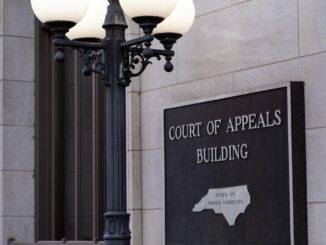
RALEIGH — A judge challenging the outcome of his North Carolina Supreme Court race was photographed wearing Confederate military garb and posing before a Confederate battle flag when he was a member of a college fraternity.
Griffin issued a statement about the Confederate uniform, which was customary during the fraternity’s annual “Old South” ball.
“I attended a college fraternity event that, in hindsight, was inappropriate and does not reflect the person I am today,” Griffin said in a statement. “At that time, like many college students, I did not fully grasp such participation’s broader historical and social implications. Since then, I have grown, learned, and dedicated myself to values that promote unity, inclusivity, and respect for all people.”
The photographs, which were obtained by The Associated Press, are from when Griffin was a student at the University of North Carolina at Chapel Hill from 1999-2003 and a member of the Kappa Alpha Order, one of the oldest and largest fraternities in the U.S., with tens of thousands of alumni.

One of the pictures, taken during the 2001 ball, shows Griffin and roughly two-dozen other fraternity members clad in Confederate uniforms. Another photograph from the spring of 2000 shows Griffin and other Kappa Alpha brothers in front of a large Confederate flag. He served in 2002 as his chapter’s president.
The emergence of the photographs comes as Jefferson Griffin, the Republican appellate judge seeking a spot on North Carolina’s highest court. Griffin, 44, is facing mounting criticism – including from some Republicans – as he seeks to invalidate over 60,000 votes cast in last November’s election, a still undecided contest in which he is trailing the Democratic incumbent by over 700 votes.
“It is clear that the Riggs campaign knows the facts of the pending litigation are not on their side and that they continue their personal smear campaign,” said Paul Shumaker on behalf of the Griffin campaign committee. “Judge Griffin has served the people of this state and our country with great honor and duty; sadly, the radical left fails to share that same sense of duty.”
Like many Republican elected officials and candidates in recent months, Griffin and his family have been receiving threats, according to a family spokesperson and personal attorney Blannie Miller. Earlier this month, Miller asked for the threats to end, making an unusually personal disclosure that the Griffins had suffered the loss of their infant daughter, who born 23 weeks prematurely.
“We respectfully ask the perpetrators of this relentless harassment campaign to end it,” said Miller, adding that the family asks for “request peace and privacy at their home while they mourn the death of their daughter” and while Griffin’s wife recuperates.
North Carolina Judicial Branch Communications Director Graham Wilson confirmed an investigation is underway into the threats to Griffin as well as his opponent, Democrat Allison Riggs.
Controversial fraternity
Kappa Alpha has proven to be a lightning rod for controversy over the decades, often due to the racist or insensitive actions of some of its members. A number of politicians have been forced to apologize for having worn Confederate costumes at the fraternity’s functions or for being photographed in front of a Confederate flag.
Jesse Lyons, a spokesman for the fraternity’s national office in Lexington, Virginia, said use of the rebel battle flag was prohibited in 2001 and displaying other Confederate symbols had been discouraged years before. The fraternity banned the wearing of the Confederate uniforms in 2010. It’s unclear if the chapter at UNC banned the uniforms before the national organization did.
“We believe in cultural humility, we respect the best parts of our organization’s history, and through education we challenge our members to work for a better future. These things are not mutually exclusive,” Lyons said.
The fraternity claims Robert E. Lee as its “spiritual founder” and long championed the Southern “Lost Cause,” a revisionist view of history that romanticizes the Confederacy and portrays the Civil War as a valiant struggle for “states’ rights” unrelated to the enslavement of Black people. In decades past, some Kappa Alpha chapters referred to themselves as a “klan,” a term that many viewed as an unsubtle wink to the Ku Klux Klan.
During Griffin’s time in the fraternity, some in his chapter questioned the appropriateness of dressing up in Confederate uniforms for the ball. Griffin opposed abandoning the tradition, according to a person familiar with the situation, who spoke on the condition of anonymity out of fear of reprisal.
Griffin said he would “not respond to unsubstantiated comments based on memories of 20-plus years past.”
Kappa Alpha founded at end of Civil War
The Kappa Alpha Order was founded in 1865, not long after Lee surrendered to the Union Army, at a Virginia college where Lee served as president. At least one of the first members was a former rebel soldier who had served under Lee, who is revered by the fraternity as the ideal of gentlemanly Southern chivalry.
For more than a century, Kappa Alpha threw “Old South” parties. They were formal affairs where the Confederate battle flag was flown and fraternity brothers dressed in replica Confederate gray uniforms and their dates wore antebellum-style hoop skirts. Sometimes they would ride through campus on horseback. Some Kappa Alpha chapters clung to their traditions, including the wearing of blackface, even as they drew protests and public sentiment shifted.
A Kappa Alpha “Old South” parade at Alabama’s Auburn University in 1992 drew supporters waving Confederate battle flags, as well as counter protesters who burned them. In 1995, a group of Kappa Alpha members at the University of Memphis hurled racial slurs while beating a Black student who caused a disturbance outside a frat party, the Memphis Commercial Appeal reported at the time.
The University of North Carolina at Chapel Hill was no exception to the turmoil. Under pressure from student group’s, the school’s Kappa Alpha chapter in 1985 canceled its annual “Sharecropper’s Ball,” which some attended in blackface. Fraternity members said blackface was worn because the event needed both Black and white attendees, but promised to discontinue the practice, according to a news story in the Daily Tar Heel student newspaper.
The Kappa Alpha chapter at North Carolina’s Wake Forest University stopped allowing members to wear Confederate uniform and display the Confederate flag in 1987. The national headquarters finally forbade confederate uniforms in 2010 after a wave of public blowback after Kappa Alpha members at the University of Alabama wore them during a parade that paused in front of the home of a black sorority.
Public officials face criticism over ties to fraternity
Virginia’s then-governor, Democrat Ralph Northam, came under intense criticism in 2019 over a racist photo that appeared on his yearbook page of his medical school. The incident led reporters to scour the college histories of other Southern leaders, forcing a number of politicians to publicly address their time as Kappa Alpha brothers.
Mississippi Gov. Tate Reeves, then the state’s Republican lieutenant governor, dodged questions in 2019 about photos showing him wearing a Confederate uniform while he was a Kappa Alpha member at Millsaps College in the early 1990s. While Reeves was enrolled there in October 1994, other members of the fraternity were disciplined for wearing afro wigs and Confederate battle flags and shouting racial slurs at black students, the AP reported at the time.
Republican South Carolina Gov. Henry McMaster declined to comment after yearbooks listed him as the leader of the fraternity’s chapter at the University of South Carolina in 1969, along with photos of members wearing Confederate uniforms and posing with a rebel flag.
Tennessee Gov. Bill Lee, also a Republican, expressed regret for participating in “Old South” parties as a student at Auburn University in the 1970s.
Additionally, North State Journal also found another North Carolina judicial connection to the fraternity. In 2014, Bob Orr, a former N.C. Court of Appeals judge and N.C. Supreme Court Associate Justice received Kappa Alpha Order’s “Distinguished Public Service Award.” Orr confirmed to North State Journal that he received the award and said it was related to distinguished judicial service.
North State Journal’s A.P. Dillon contributed to this report.



